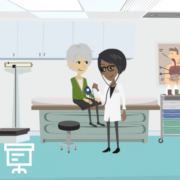How to Be a Partner in Your AML Care
How to Be a Partner in Your AML Care from Patient Empowerment Network on Vimeo.
How can acute myeloid leukemia (AML) patients take a proactive approach to their care? Expert Dr. Ellen Ritchie shares advice for qualities to look for in your AML care provider and how to ensure all your questions are answered by your healthcare team.
Dr. Ellen K. Ritchie is assistant professor of medicine and a member of the Leukemia Program at the Weill Cornell Medical College of Cornell University and the New York Presbyterian Hospital. More about Dr. Ritchie, here.
Related Resources:
Being Pro-Active in Your Care: Key AML Testing to Advocate For
Advocating for Key AML Testing: Advice From an Expert

|

|

|
Transcript:
Katherine:
Dr. Ritchie, what advice do you have for patients to help them feel more confident in speaking up and advocating, being a partner in their care?
Dr. Ritchie:
Well, when you choose a leukemia doctor, you need to choose someone that you can actually communicate with. Someone who you feel is not allowing you to ask questions, or is not curious about what your life is like, you may want to think, I want to check out somebody else.
Because it’s really important you like the person who’s your doctor, and that you have a trust relationship together. So, it’s really – I tell some patients it’s a marriage of convenience that we have. And that you really have to think of it that way. If someone doesn’t allow you to ask questions or if they are not fully answering your questions in a way that you understand, try and speak up for yourself and make sure that the doctor tries to address that. And if the doctor won’t address those things for you, or you feel like you don’t understand what is being explained to you, then you can think about trying to see someone else. I think it’s really important if you can, to write down as many questions as you have about your disease before you come in.
Because often what happens is you get there, you’re stunned by the amount of information, and the questions you wanted to ask, you forget. And the next day, you’re like, “Ugh, I didn’t ask these questions.” So, before you come in, if you write questions. Questions about insurance coverage, that may not be something that we go over. Or questions about toxicities, or questions, “If I’m going to lose my hair, do you have the name of a wig facility?” All these questions that you might have, put them on a piece of paper, so that they can be addressed when you’re with the doctor. And other things will come up, you’ll have other questions when you’re there, but make sure your fundamental questions are answered.










